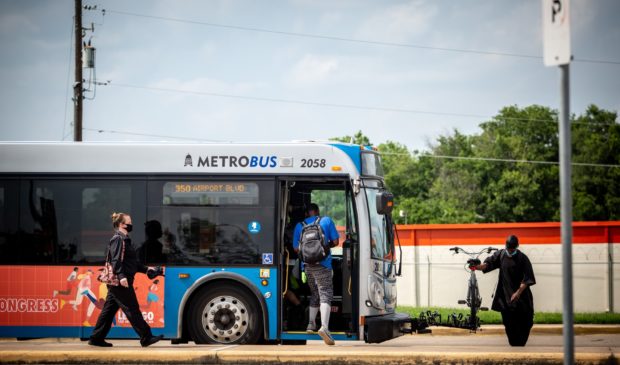Photo by Gabriel C. Pérez/KUT
Capital Metro board votes to establish transit police force
Tuesday, August 31, 2021 by
Nathan Bernier, KUT The board governing the Capital Metropolitan Transportation Authority voted overwhelmingly Monday to move forward with establishing a transit police department. The process is expected to take more than 18 months and will include outreach to skeptical members of the public.
The proposal faces opposition from community groups concerned about excessive policing. The local chapter of the Amalgamated Transit Union, which represents transit workers, backs the agency’s policing plan.
Right now, Capital Metro employs about 160 off-duty Austin police officers to provide security. Transit agency staffers argue those officers are not always available.
“We realize that they are APD officers first, and if their organization requires them to work a particular shift or overtime, they are obligated to go there,” Gardner Tabon, Capital Metro’s executive vice president for public safety, said. “We need people who are dedicated to our organization.”
In addition to uniformed police officers, Capital Metro’s public safety proposal includes hiring “public safety ambassadors,” civilian employees who would provide a visible presence on the transit network, answer customer and employee questions, and report activity to first responders. Fifteen public safety ambassadors are in the process of being hired. One supervisor is already on the payroll.
The plan also calls for hiring intervention specialists who could connect people with social services.
But it was the prospect of having another police department in Austin — in addition to police departments run by the city, Travis County, the Austin school district, the University of Texas, Austin Community College and others — that drew concerns from community activists at Monday’s board meeting.
“There’s a lot more work and thought that needs to and can go into this, and many more minds from our community can and should be brought into this process,” João Paulo Connolly, organizing director for the Austin Justice Coalition, told board members during a public comment period.
Connolly, who’s also a member of Austin’s Community Police Review Commission, raised questions about body-camera policies, complaint-intake processes and discipline for officers who break protocol.
“If your police force has very little oversight,” Connolly said, “your police force will antagonize members of the community, particularly Black and brown folks who make up your core ridership in Austin.”
Board Member Ann Kitchen, who’s also on City Council, argued the vote should be delayed to allow more time for public input, specifically from the groups that brought concerns to the board: the Austin Justice Coalition, the Austin Area Urban League, Just Liberty, Planning Our Communities and People United for Mobility Action.
“I just really think that respecting our community voices is important to (establishing) trust,” she said.
Ultimately, Kitchen abstained from the vote while the remaining seven board members present opted to move ahead with the policing plan, saying public input would guide the process along the way.
“I think we have an imperative as a board to do everything we can as quickly as we can to protect our front-line personnel,” Board Chair Wade Cooper said. “We’ve known for some time that we have put them in harm’s way in many respects.”
The process to set up a transit police force is far from complete. The Capital Metro board is requiring that staff return before Oct. 31 to present plans on how to shape a committee that would oversee the police department. The board also wants a say on the process developed to hire top staff.
This story was produced as part of the Austin Monitor’s reporting partnership with KUT.
The Austin Monitor’s work is made possible by donations from the community. Though our reporting covers donors from time to time, we are careful to keep business and editorial efforts separate while maintaining transparency. A complete list of donors is available here, and our code of ethics is explained here.
You're a community leader
And we’re honored you look to us for serious, in-depth news. You know a strong community needs local and dedicated watchdog reporting. We’re here for you and that won’t change. Now will you take the powerful next step and support our nonprofit news organization?




